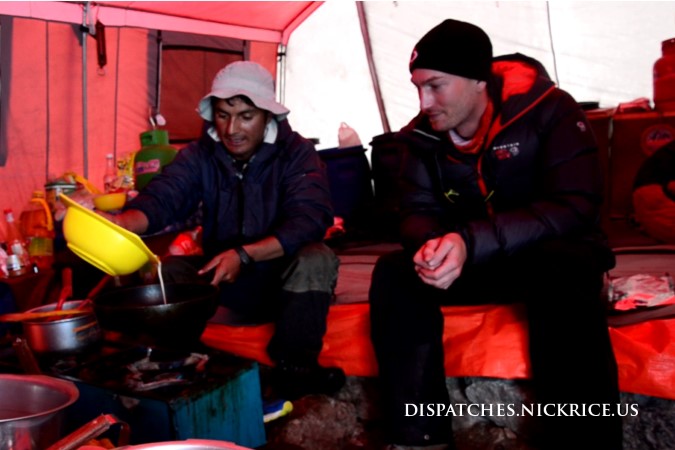
Today, we woke up at 7:45am, had a leisurely breakfast, and spent the rest of the day in our tents reading and staying out of the rain. These are the days during cold, wet storms, trapped in our tents that we wonder to ourselves why we do what we do. Why do we leave the luxuries that we take for granted in our normal lives to sleep on stone and ice and risk life and limb, away from our friends and loved ones? But it is in these moments of introspection that we learn a bit more about who we are and where we belong in the vast scope of the universe. With nothing to distract us from our raw emotions, we’re left to contemplate our path in this world. I spent the afternoon reading one of my favorite books. Since the day was uneventful, I’ll leave you with a quote related to why we are drawn to and often humbled by mountains:
“To understand even a little about geology gives you special spectacles through which to see a landscape. They allow you to see back in time to worlds where rocks liquefy and seas petrify, where granite slops about like porridge, basalt bubbles like stew, and layers of limestone are folded as easily as blankets. Through the spectacles of geology, terra firma becomes terra mobilis, and we are forced to reconsider our beliefs of what is solid and what is not. Although we attribute to stone a great power to hold time back, to refuse its claim (cairns, stone tablets, monuments, statuary), this is true only in relation to our own mutability. Looked at in the context of the bigger geological picture, rock is as vulnerable to change as any other substance.
Above all, geology makes explicit challenges to our understanding of time. It giddies the sense of here-and-now. The imaginative experience of what the writer John McPhee memorably called ‘deep time’ – the sense of time whose units are not days, hours, minutes, or seconds but millions of years or tens of millions of years – crushes the human instant; flattens it to a wafer. Contemplating the immensities of deep time, you face, in a way that is both exquisite and horrifying, the total collapse of your present, compacted to nothingness by the pressures of the pasts and futures too extensive to envisage. And it is a physical as well as cerebral horror, for to acknowledge that the hard rock of a mountain is vulnerable to the attrition of time is of necessity to reflect on the appalling transience of the human body.
Yet there is also something curiously exhilarating about the contemplation of deep time. True, you learn yourself to be a blip in the larger projects of the universe. But you are also rewarded with the realization that you do exist – as unlikely as it may seem, you do exist.”
